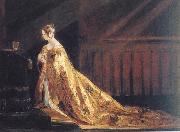Wholesale Oil Painting No Minimum |
|||||||||||
|
|
|||||||||||

|
|||||||||||
|
|
|
||||||||
Charles Robert Leslie1794 - 1859 was born in London on 19 October 1794. His parents were American, and when he was five years of age he returned with them to their native country. They settled in Philadelphia, where their son was educated and afterwards apprenticed to a bookseller. He was, however, mainly interested in painting and the drama, and when George Frederick Cooke visited the city he executed a portrait of the actor from recollection of him on the stage, which was considered a work of such promise that a fund was raised to enable the young artist to study in Europe. He left for London in 1811, bearing introductions which procured for him the friendship of West, Beechey, Allston, Coleridge and Washington Irving, and was admitted as a student of the Royal Academy, where he carried off two silver medals. At first, influenced by West and Fuseli, he essayed high art, and his earliest important subject depicted Saul and the Witch of Endor; but he soon discovered his true aptitude and became a painter of cabinet-pictures, dealing, not like those of David Wilkie, with the contemporary life that surrounded him, but with scenes from the great masters of fiction, from Shakespeare and Cervantes, Addison and Moli??re, Swift, Sterne, Fielding and Smollett. Of individual paintings we may specify Sir Roger de Coverley going to Church (1819); May-day in the Time of Queen Elizabeth (1821); Sancho Panza and the Duchess (1824); Uncle Toby and the Widow Wadman (1831); La Malade Imaginaire, act iii. sc. 6 (1843); and the Dukes Chaplain Enraged leaving the Table, from Don Quixote (1849). Many of his more important subjects exist in varying replicas. He possessed a sympathetic imagination, which enabled him to enter freely into the spirit of the author whom he illustrated, a delicate perception for female beauty, an unfailing eye for character and its outward manifestation in face and figure, and a genial and sunny sense of humour, guided by an instinctive refinement which prevented it from overstepping the bounds of good taste. In 1821 Leslie was elected A.R.A., and five years later full academician. In 1833 he left for America to become teacher of drawing in the military academy at West Point, but the post proved an irksome one, and in some six months he returned to England. |
||||||||
|
|
||||||||
Queen Victoria in her Coronation Robes
Queen Victoria in her Coronation Robes Painting ID:: 28385 |
1818-9
Oil on canvas 45.7 x 60.9 cm
(18 x 24 in)
Victoria and Albert Museum London (mk63) 1818-9 Oil on canvas 45.7 x 60.9 cm (18 x 24 in) Victoria and Albert Museum London (mk63) |
|||||||
|
CONTACT US |

